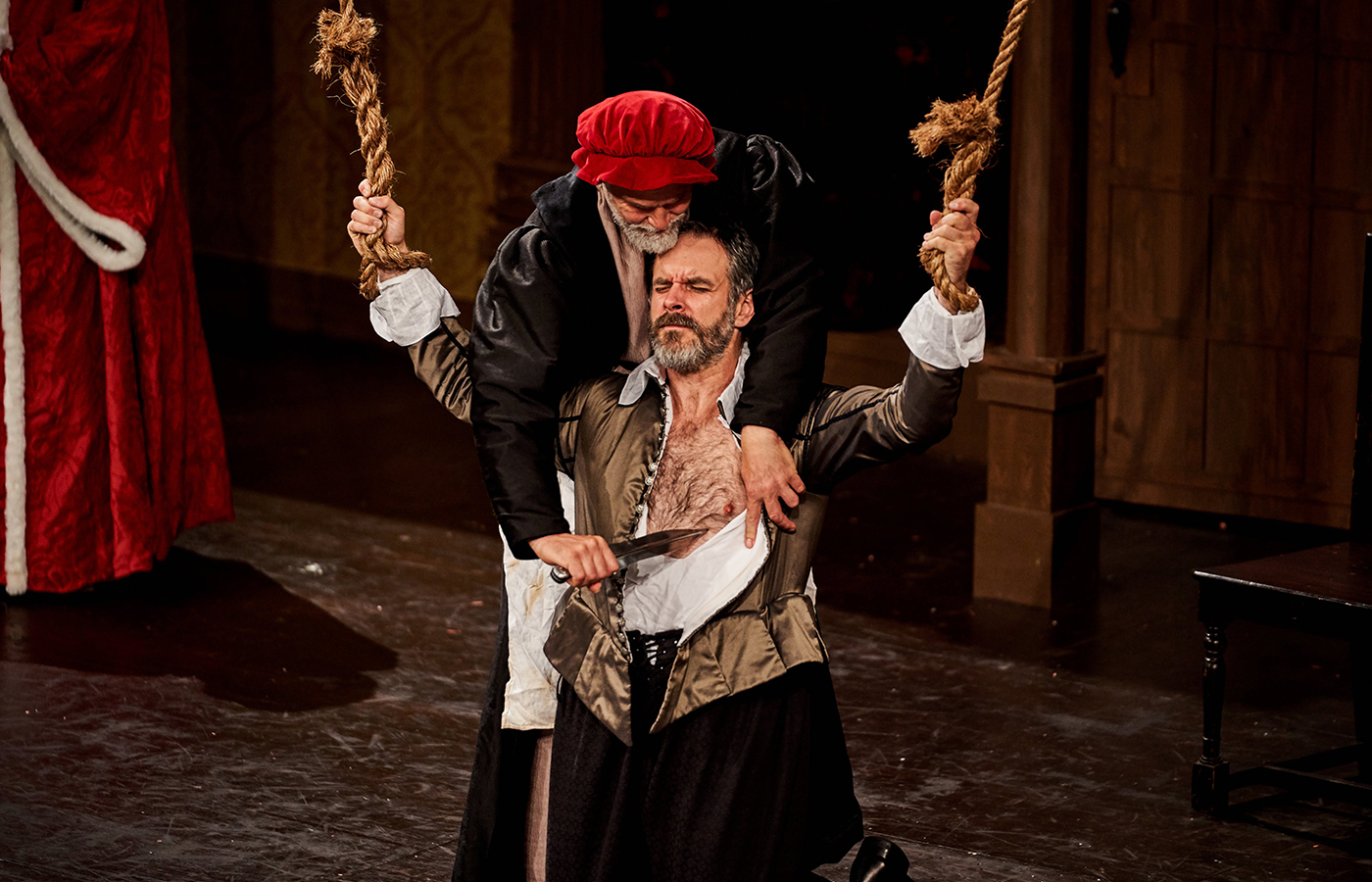Pop-up Globe, September 12
4.5/10
Shylock’s demented desire for a pound of Antonio’s flesh (with all its anti-Semitic type-casting implications) makes him the supposed villain of this comedy. But for whom, exactly, are we supposed to cheering? Portia? She is willing to accept an airheaded, money-grubbing playboy to share her vision of long-term connubial bliss. Good luck with that.
Shylock always seems to have gate-crashed The Merchant of Venice, a play named for Antonio, who has all the three-dimensionality of a selfie taken by a bigot. Infinitely more interesting than anyone else capering about the stage, Shylock could have stepped out of a later Shakespeare work into this earlier one, and in the process he does his best to confound the idea that it’s even a comedy. Despite the smallness of the role (360 lines of impassioned verse or sentences of prose), he is the only character blessed with some semblance of complexity, and – his pathetic submission to the court’s judgement at the end of Act IV, apart – when he is present he towers over the play.

At least that is how it should work. But cast it and perform it so Shylock is impotent and lamentable, and what do you have? A comedy-drama with the drama expunged and the quality of the comedy somewhat strained.
Director David Lawrence has cast Peter Daube as Shylock, and Daube’s interpretation lacks intensity and density. He delivers his withering lines about Antonio as though discussing an apple with a bruise. Later, when Jessica, his spiteful daughter, has not only eloped, she has done so with a Christian and a large share of Shylock’s loot, he is about as cross as a school teacher presented with shoddy homework. Daube is at his best delivering the “Hath not a Jew eyes?” speech in Act III (the poignancy of which would have been more potent 420 years ago); elsewhere he is merely petulant, when a deeper fury is required.
With a lightweight Shylock the play becomes all froth, the trial scene apart. Obviously Portia comes closest to being a worthy foil, and Patrick Griffin is a friskier Portia than some more coy portrayals. I actually prefer this version of her, which makes it more credible that she could, in fact, fall for the frightful Bassanio (Cameron Moore). In this all-male cast Lawrence opts to extract wafer-thin drag-queen gags from Will Alexander as Nerissa and from Jade Daniels as an Amazon Jessica, able to pick up her pint-sized lover Lorenzo (Patrick Carroll) like a doll.
Mercifully, we canter briskly through the tedious casket scenes, with Jason Te Kara playing the Prince of Morocco to the hilt of his sabre, and Chris Huntly-Turner ensuring the Prince of Aragon is the text’s “blinking idiot”. Asalemo Tofete has similar fun with Launcelot Gobbo, the servant who swaps masters as readily as rugby league player swap teams. By contrast Act V – really just a coda that should be breezed through as rapidly as possibly – is drawn out well beyond its welcome.
Although the use of music here is not as effective as in Pop-up Globe’s concurrent The Comedy of Errors, it works well enough to justify Lorenzo’s sudden burst of lyricism when he rightly observes: “The man that hath no music in himself,/Nor is not moved with concord of sweet sounds,/Is fit for treasons, stratagems and spoils…” Now how did Shakespeare know about modern Australian politicians?
But if you only see one show at Pop-up Globe, make it Macbeth.
Until October 21.